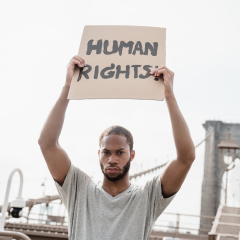Business and human rights, modern slavery and sustainable development

Blog post by Prof. Natalia Szablewska
As the 11th UN Forum on Business and Human Rights opened (28-30 November 2022) with a focus on ‘Rights holders at the centre: Strengthening accountability to advance business respect for people and planet in the next decade’, it is worth to pause and consider where we are and the direction we should be heading.
The most recent estimates indicate that nearly 50 million people worldwide, and some 136,000 in the United Kingdom (UK) alone, are trapped in modern slavery, with 86% of those in forced labour in the private sector. It makes modern slavery a more acute problem today than ever in human history. As this also marks a 10 million increase since the previous estimate five years ago, what then has gone wrong?
For starters, modern slavery is a very complex issue that requires comprehensive and coordinated responses, thus addressing it won’t be a simple fix. Modern slavery—an umbrella term capturing various forms of severe human exploitation ranging from human trafficking, forced labour or bonded labour to forced marriage - is a multifaceted social, economic and political problem.
There are similarities between these legally distinct legal categories but also differences which require adjusting responses to remain sensitive to local or regional contexts.
In other words, what might work in one place might not necessarily work elsewhere. Thus, in practical terms, effective cooperation and global partnerships between different stakeholders are essential, as is sharing of information and data to address the prevalence of modern slavery, increase transparency and allow for greater accountability for harms caused, irrespective of where they might have occurred.
Despite the obvious solutions, there are, however, further challenges. Responses to modern slavery do not always align with states’ other national priorities, and migration management is a good example here. Despite the migration trend remaining relatively stable since the 1990s, it is forced migration and displacement that are on a rise globally. Be it for civil unrest, conflict, natural disasters or climate change (more on it below), the motivations for people’s mobility are vast.
What, however, we do know is that when people find themselves in perilous circumstances and/or their legal status in the destination countries is unsettled, they become highly vulnerable to exploitation, including modern slavery. It is often the states themselves that, due to their policies and laws, heighten the vulnerability of certain groups. It is important, therefore, that ‘migration’ and efforts to tackle ‘modern slavery’ are not decoupled but seen as part of the same protection continuum that needs to be afforded to all on a non-discriminatory basis.
Secondly, human exploitation often (if not always) goes hand in hand with environmental degradation which requires looking beyond prioritising one over the other.
The so-called ‘fast fashion’ is a good example. The fashion industry produces 10% of global carbon emissions, equivalent to that of the EU, as well as is considered a high-risk sector for modern slavery and other forms of exploitation. There is further compelling evidence showing a strong link between ecosystem decline by, e.g., overfishing, illegal fishing and bonded labour.
As climate change continues to transform global systems exposing us to the heightened risk of displacement, with some bearing much higher consequences and much sooner, it will further reshape and increase the vulnerability of different individuals, groups and communities to human rights and environmental harms.
The recent COVID-19 pandemic as well as conflicts and civil unrest globally evidence that volatility to global shocks, be it human-made or natural, cannot be tackled in isolation.
That takes us back to where the private sector fits into it. Business and human rights agenda has been gaining in popularity since the 1990s when it became clear that relying on corporate social responsibility (CSR) alone might not be sufficient. Consequently, along with the burgeoning human rights movement, the United Nations (UN) started working towards more concrete rules of engagement for businesses.
One of the key developments in this space was the introduction of the UN Guiding Principles on Business and Human Rights (UNGPs) in 2011, consisting of 31 principles grouped around three pillars (‘protect, respect and remedy’), clarifying states’ duties as well as business’ responsibilities in relation to corporate action that might infringe on human rights.
Fast forward a few years and, as of today, we have legislation in a number of countries that prescribe businesses to take specific action to account for the corporate impact of their operations and supply chains. Just to name a few, the UK Modern Slavery Act 2015, the French Law on the Corporate Duty of Vigilance 2017, the Australian Modern Slavery Act 2018 (Cth), and further legislation passed this year alone in Norway, Germany, and at the European Union (EU) level (directive on corporate sustainability due diligence) that not only seek liability for business causing human rights but also environmental harms.
There are a number of other countries that are currently looking to develop or are in process of passing similar legislation, including New Zealand, Canada, South Korea and the Netherlands.
These are all positive developments that need to be supported and contributed to by all stakeholders and sectors of society. As the 2030 Agenda for Sustainable Development is centred on the transformative promise of “leaving no one behind”, the implementation of Sustainable Development Goals, including addressing modern slavery globally, is after all everyone’s business.

Prof. Natalia Szablewska
Natalia is Professor in Law and Society at the Open University Law School.
Natalia specialises in public international law and torts law. Her interdisciplinary research has examined the different aspects of forced migration, modern slavery and gender (in)equalities in post-conflict societies using multiple and mixed methods.
Natalia’s current research focus is on the legal, social, political and economic linkages between business and human rights, modern slavery and sustainable development.
She currently serves on the Modern Slavery Leadership Advisory Group to the New Zealand Government and as a Chair of Business and Human Rights Committee for Australian Lawyers for Human Rights (ALHR).
Her publications and engagement activities can be found on her Open University profile.